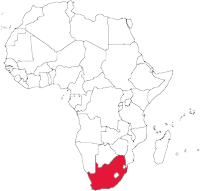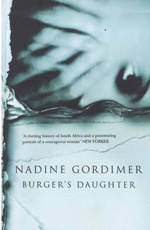
 When, in 1991, Nadine Gordimer became just the third African writer to become a Nobel Laureate in Literature, it was arguably
for Burger's Daughter that she was chiefly being recognised. Published in 1979, it is often quoted as being a classic about
apartheid in South Africa. It isn't. It is about the people that fought it and the people that suffered from it, and the complex
and difficult relationships they had with each other and with their country.
When, in 1991, Nadine Gordimer became just the third African writer to become a Nobel Laureate in Literature, it was arguably
for Burger's Daughter that she was chiefly being recognised. Published in 1979, it is often quoted as being a classic about
apartheid in South Africa. It isn't. It is about the people that fought it and the people that suffered from it, and the complex
and difficult relationships they had with each other and with their country.
The book focuses on Rosa Burger, daughter of Lionel, a prominent left wing anti-apartheid activist who dies of illness in jail. Rosa is brought up to share her parents' political and social beliefs and, from a young age, is participating in illegal activities. With the death of her father she is left alone for the first time in her life. Rosa uses the time to re-examine her role and motives for her actions. An unpleasant encounter with a black student, who derides the ability of white liberals to understand suffering, leaves her disorientated, and she flees South Africa to Europe. There she meets some of her father's comrades from international socialist movements. There she is lauded by the media, not as Rosa, but as Lionel Burger's daughter, prompting her to return to South Africa to forge a new identity.
There is a brutal honesty to the book which perhaps only someone like Gordimer, herself an anti-apartheid activist, could get away with. It is a minute psychological dissection of a woman born into a fight that she could not escape. Rosa's father's heroism stems partly from his choosing to be involved. Her involvement is a heritage, something that leads to a complex relationship between her and the ideas she is fighting for. For the black students who deny her the right to empathise with them, and the Europeans who are far removed from the day-to-day realities of what it means to be a victim, she can only be 'Burger's daughter', a woman doing great things for sometimes obscure reasons. Burger's Daughter is a study of what it means to Rosa fight against something that she doesn't have to be a victim of, and what it means to her to choose to suffer from Apartheid, and what it means to others, black and white, for her to make that choice.
Gordimer's writing is undoubtedly dense and slow. The narrative is largely driven by Rosa's internal monologue, which can be unfocused. However, it is not the unfolding of events in a tumultuous country that we are invited to witness, but the unfolding of a new realisation in Rosa about who she is. The psychological focus does not lessen the message about apartheid, however. The book's beauty is that by exposing the frailty and doubt in the white liberal population, they seem all the more brave for the decisions they take. This is a wonderful book about the real people that underlie political movements, and, by extension, the movements themselves, and an amazing insight into a South Africa at its most socially and racially divided.


Penguin, paperback, 9780140055931
Bloomsbury, paperback, 9780747549796